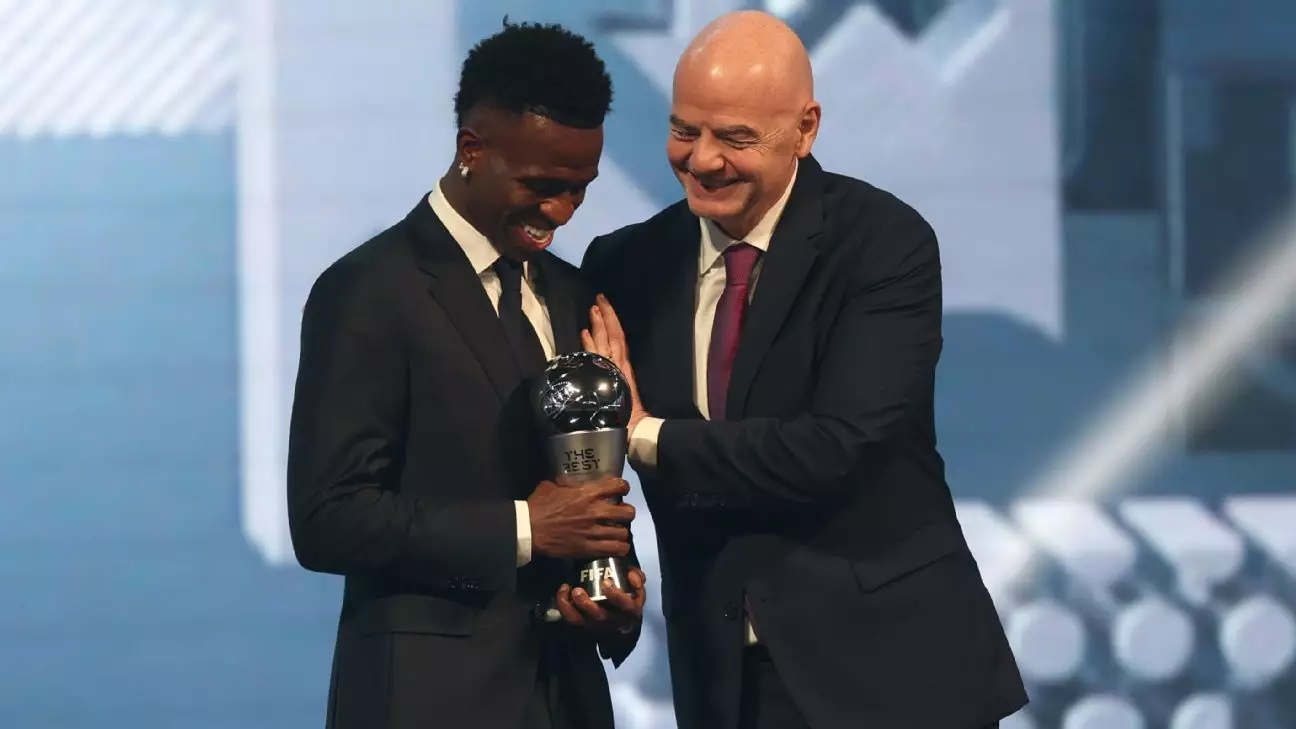Vinícius Júnior’s recent triumph at FIFA’s The Best men’s player of the year award has stirred the pot in the world of football, especially given the context in which it arrived. The Brazilian forward of Real Madrid secured this prestigious accolade, garnering 48 points, placing him above notable competitors such as Manchester City’s Rodri and his own teammate Jude Bellingham. This recognition couldn’t have come at a more significant moment in Vinícius’s career, especially following a disheartening loss at the Ballon d’Or, which he controversially didn’t win despite perceived standout performances. It’s a prove-positive sentiment that continues to resonate: sometimes the awards do not tell the full story.
Vinícius’s victory serves not only as a personal accomplishment but also as a comment on the football community’s collective priorities and values. The new award reflects a more inclusive voting process that showcases a variety of voices—national team coaches, players, journalists, and fans—allowing for a broader analysis of who truly shines on the field. His win can be interpreted as a boon to players who feel disenfranchised by traditional voting systems that prioritize certain leagues or teams over others.
Vinícius’s response to his critics encapsulates a broader narrative of resistance in sport. “They have tried and tried to invalidate me, to diminish me,” he stated, showing a tenacity that many young athletes can relate to. His commitment to self-recognition stands as a beacon for aspiring players who face a similar storm of doubt and challenge. Vinícius’s message to younger fans reflects a mindful acknowledgement of the pressures placed on budding talent in a sports world that often celebrates an elite few while sidelining the rest.
In his social media post, he articulated the sheer struggle of overcoming systemic barriers that questioned his worth. The phrase “the system didn’t care about me” speaks volumes to the sociocultural dynamics prevalent within professional sports. Often, athletes from less recognized backgrounds find themselves marginalized, and Vinícius’s story offers both inspiration and insight into the emotional labor that many endure behind the scenes.
The 24-year-old’s sentiments extend beyond personal reflection. He acknowledged the influence of his support system, praising his family, teammates, and clubs—Flamengo and Real Madrid—as pivotal to his development. This emphasis on community serves as a valuable reminder that individual success is rarely a solitary journey; it involves a network of relationships that foster growth and resilience. In professional sports, where individual prowess often takes center stage, acknowledging collective effort helps redefine success.
The response from Vinícius’s contemporaries, like Neymar, further illustrates the bond shared among athletes. Neymar’s words of encouragement to “keep flying” show the camaraderie that exists amongst professional footballers, illustrating how success can galvanize support and mutual respect. In a highly competitive arena, such solidarity is paramount for maintaining morale and purpose.
However, Vinícius’s win also ignites a broader conversation about how awards like the Ballon d’Or and FIFA recognitions are structured. Real Madrid’s boycott of the Ballon d’Or ceremony echoed concerns over the legitimacy of its voting processes. Club president Florentino Perez criticized the selection of journalists involved in the voting, suggesting that an independent panel should be engaged—one that understands the sport intimately. The outcry surrounding this year’s results indicates how awards can spark debates that transcend individual achievements and touch upon issues of representation, integrity, and fairness in sports.
As the footballing community processes Vinícius’s achievements, classifying his successful year as a milestone not just for him personally, but as a meaningful collective progression is vital. He embodies a modern athlete who not only values personal accolades but champions a broader narrative of inclusion and respect for the diverse backgrounds from which players emerge.
Vinícius Júnior’s recent award win is more than a testament to his skill on the field; it exemplifies resilience, community support, and a burgeoning dialogue on the meaning of recognition in sports. He serves as a figure urging for visibility and acknowledgment of talents beyond conventional parameters, proving that true greatness often lies in persistence and self-advocacy.

